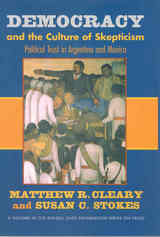2 books about Stokes, Susan

Democracy and the Culture of Skepticism
The Politics of Trust in Argentina and Mexico
Matthew R. Cleary
Russell Sage Foundation, 2006
Some theorists claim that democracy cannot work without trust. According to this argument, democracy fails unless citizens trust that their governing institutions are serving their best interests. Similarly, some assert that democracy works best when people trust one another and have confidence that politicians will look after citizen interests. Questioning such claims, Democracy and the Culture of Skepticism, by Matthew Cleary and Susan Stokes, suggests that skepticism, not trust, is the hallmark of political culture in well-functioning democracies. Drawing on extensive research in two developing democracies, Argentina and Mexico, Democracy and the Culture of Skepticism shows that in regions of each country with healthy democracies, people do not trust one another more than those living in regions where democracy functions less well, nor do they display more personal trust in governments or politicians. Instead, the defining features of the healthiest democracies are skepticism of government and a belief that politicians act in their constituents' best interest only when it is personally advantageous for them to do so. In contrast to scholars who lament what they see as a breakdown in civic life, Cleary and Stokes find that people residing in healthy democracies do not participate more in civic organizations than others, but in fact, tend to retreat from civic life in favor of private pursuits. The authors conclude that governments are most efficient and responsive when they know that institutions such as the press or an independent judiciary will hold them accountable for their actions. The question of how much citizens should trust politicians and governments has consumed political theorists since America's founding. In Democracy and the Culture of Skepticism, Matthew Cleary and Susan Stokes test the relationship between trust and the quality of governance, showing that it is not trust, but vigilance and skepticism that provide the foundation for well-functioning democracies. A Volume in the Russell Sage Foundation Series on Trust
[more]

Designing Democratic Government
Making Institutions Work
Margaret Levi
Russell Sage Foundation, 2008
What are the essential elements of a democracy? How can nations ensure a political voice for all citizens, and design a government that will respond to those varied voices? These perennial questions resonate strongly in the midst of ongoing struggles to defend democratic institutions around the world and here at home. In Designing Democratic Government, a group of distinguished political scientists provides a landmark cross-national analysis of the institutions that either facilitate or constrain the healthy development of democracy. The contributors to Designing Democratic Government use the democratic ideals of fairness, competitiveness, and accountability as benchmarks to assess a wide variety of institutions and practices. John Leighly and Jonathan Nagler find that in the U.S., the ability to mobilize voters across socioeconomic lines largely hinges on the work of non-party groups such as civic associations and unions, which are far less likely than political parties to engage in class-biased outreach efforts. Michael McDonald assesses congressional redistricting methods and finds that court-ordered plans and close adherence to the Voting Rights Act effectively increase the number of competitive electoral districts, while politically-drawn maps reduce the number of competitive districts. John Carey and John Polga-Hecimovich challenge the widespread belief that primary elections produce inferior candidates. Analyzing three decades worth of comprehensive data on Latin American presidential campaigns, they find that primaries impart a stamp of legitimacy on candidates, helping to engage voters and mitigate distrust in the democratic process. And Kanchan Chandra proposes a paradigm shift in the way we think about ethnic inclusion in democracies: nations should design institutions that actively promote—rather than merely accommodate—diversity. At a moment when democracy seems vulnerable both at home and abroad, Designing Democratic Government sorts through a complex array of practices and institutions to outline what works and what doesn't in new and established democracies alike. The result is a volume that promises to change the way we look at the ideals of democracy worldwide.
[more]
READERS
Browse our collection.
PUBLISHERS
See BiblioVault's publisher services.
STUDENT SERVICES
Files for college accessibility offices.
UChicago Accessibility Resources
home | accessibility | search | about | contact us
BiblioVault ® 2001 - 2024
The University of Chicago Press









